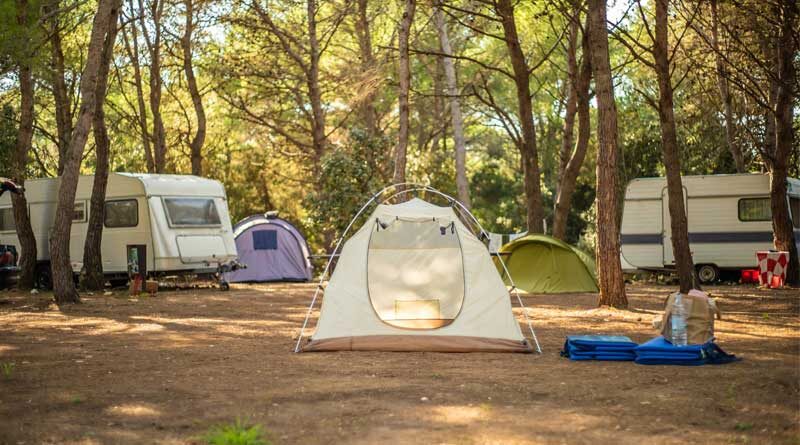Can you Tent Camp in an RV Spot?
RV parks are places where those with recreational vehicles can park their RVs and stay overnight, or longer if they prefer. These parks usually have distinct spaces referred to as “sites,” and they may include extra features and facilities such as power connections, water and sewer connections, bathhouses, Wi-Fi hotspots, etc.
This is not what most people think about when they hear the word camping. Camping evokes visions of sitting around a campfire with a tent nearby, making s’mores, and exploring the wilderness. A campground is usually a location in which those who are tent camping stay for overnight visits or longer. So, is it possible to tent camp in an RV spot at a park if you wanted? Let’s find out! Keep reading to learn more.
How are RV Spots different?
It is important to understand how an RV park differs from a campsite. Of course, the primary reason is obvious. Campsites are geared towards tent campers, while RV parks are focused on those using recreational vehicles to go camping. However, there are some distinct differences at an RV park that a tent camper may not be accustomed to.
They may be crowded
First and foremost, RV parks can be a bit more crowded than campsites. This is great if you are looking for a bit of party or social gathering but can be a real bummer for those looking to quietly get closer to nature. It is likely that tent camping at an RV park will result in pitching between a couple of RVs or setting up camp in an area that isn’t made for tents.
More distractions
RV parks have many great amenities nowadays, which are a fantastic feature for those looking for a resort-type feeling on their trip. This atmosphere may not be as appealing to tent campers, especially if the goal is to disconnect from all of the modern technology. Some RV parks are known to have large outdoor televisions, convenience stores, and other facilities for maximum comfort.
They are more expensive
If you are looking for an authentic nature experience and are used to “roughing” it a bit more, then you may be a bit surprised by an RV park. As mentioned, they offer a lot of great add-ons, but these extras are usually reflected in the price. So, if you are staying at an RV park, just be prepared to pay a bit more than you would at a campsite – at least you’ll get to charge your phone.
Will RV Parks let you pitch?
Even though tent camping varies quite a bit from traveling with an RV, you will likely still be able to enjoy pitching a tent in an RV spot at a park. Determining whether or not a specific RV park allows its campers to use a spot for a tent typically depends on the rules and policies for each individual park.
There are a few things that any tent camper should consider if contemplating staying at an RV park. The first thing to consider is space. This may seem counterintuitive, but RVs tend to require less space than a tent regarding camping spots. While tents are certainly less massive than RVs, camping tents need a wider base to allow for the stakes that tether the tent to the ground. You also want to ensure that the spots at the RV park you are considering aren’t cemented spots – sometimes RV parks use concrete slabs for convenience to those driving recreational vehicles.
How long can you stay?
Depending on the RV park, there may be a maximum stay policy related to how long recreational vehicle drivers and tent campers reserve a spot at the park. This is determined by each individual campground and usually the result of a couple of different factors. Popularity and demand can play a large role in whether or not a campground has a maximum stay. For example, if the campground is has a great selection of amenities and is incredibly popular, you may find that they regulate how long you can stay.
Other factors that contribute to whether or not an RV park imposes a limited stay include the focus of the park. Are they catering to long term campers, or is it more of a vacation park? This will determine whether or not they let campers stay extra nights or if they increase prices to keep long-term campers at bay. On the other hand, there are other parks that cater to long-term campers. You will likely find these in warmer climates and with more luxurious services and amenities.
Expect to pay more
Tent camping is cheaper than camping in an RV, and the reason is that you are not paying for all of the extra bells and whistles. Much like RV parks, each campground offers different services and perks, affecting the price. For example, a campground with very little to offer in the form of amenities usually ranges between $5 to $15 per night.
However, if you choose a campsite with a few more perks, such as electricity and bathroom facilities, you are likely looking to pay $25 to $30 each night. For comparison, RV parks typically charge anywhere from $25 to $80, depending on how much they offer.
The bottom line
For most RV parks, pitching a tent on one of their RV spots is not going to be a problem. After all, they are a business whose goal is to make money. However, it is essential to understand that camping in a tent at an RV park is much different from camping in a tent at a campground. Campers can expect a bit more luxury, noise, and community activities at RV parks. The best way to determine whether or not an RV park allows tent camping is simply by giving them a call and asking. Confirm that their spots are wide enough and are not made out of concrete. No matter why you choose, just remember that it is a vacation – step away from your phone, hang around outside, and get closer to nature.




